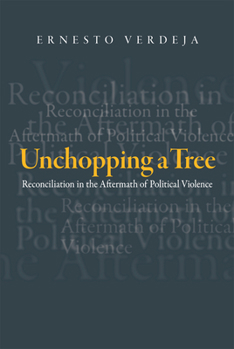Unchopping a Tree: Reconciliation in the Aftermath of Political Violence (Politics History & Social Chan)
(Part of the Politics, History, and Social Change Series)
Political violence does not end with the last death. A common feature of mass murder has been the attempt at destroying any memory of victims, with the aim of eliminating them from history. Perpetrators seek not only to eliminate a perceived threat, but also to eradicate any possibility of alternate, competing social and national histories. In his timely and important book, Unchopping a Tree, Ernesto Verdeja develops a critical justification for why transitional justice works. He asks, OC What is the balance between punishment and forgiveness'a And, OC What are the stakes in reconciling?OCOa Employing a normative theory of reconciliation that differs from prevailing approaches, Verdeja outlines a concept that emphasizes the importance of shared notions of moral respect and tolerance among adversaries in transitional societies. Drawing heavily from cases such as reconciliation efforts in Latin America and AfricaOCoand interviews with people involved in such effortsOCoVerdeja debates how best to envision reconciliation while remaining realistic about the very significant practical obstacles such efforts face Unchopping a Tree addresses the core concept of respect across four different social levelsOCopolitical, institutional, civil society, and interpersonalOCoto explain the promise and challenges to securing reconciliation and broader social regeneration. "
Format:Hardcover
Language:English
ISBN:143990054X
ISBN13:9781439900543
Release Date:October 2009
Publisher:Temple University Press
Length:240 Pages
Weight:0.91 lbs.
Dimensions:0.9" x 6.4" x 8.4"
Related Subjects
Philosophy Political Science Politics & Social Sciences Social Science Social SciencesCustomer Reviews
0 rating





